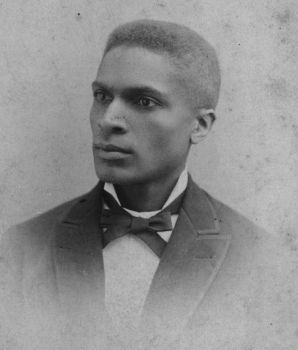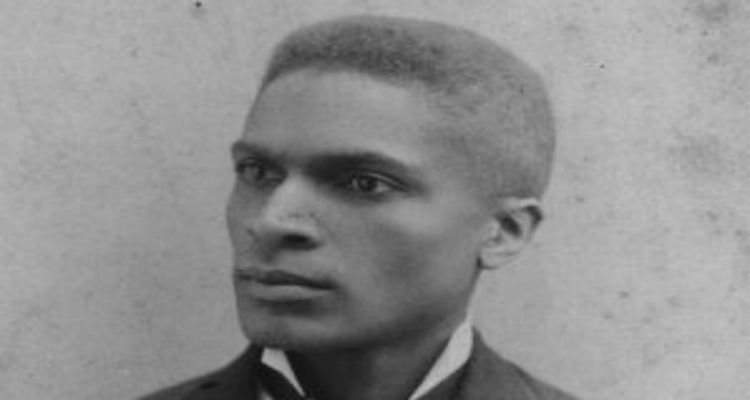 Fredrick L. McGhee was a Black civil rights activist and one of America’s first African American lawyers.
Fredrick L. McGhee was a Black civil rights activist and one of America’s first African American lawyers.
McGhee was born on October 28, 1861 in Aberdeen, Mississippi, to Abraham McGhee and Sarah Walker, who were enslaved. His father, from Blount County, Tennessee, learned how to read and write without being formally educated, and later became a Baptist preacher. Abraham McGhee taught his three children, Mathew, Barclay and Fredrick, how to read and write. McGhee and his family made their way to Knoxville, Tennessee, after the war, where he attended a United Presbyterian Church freemen’s school, from which he graduated in 1877.
McGhee moved to Chicago, Illinois in 1879, where he worked as a waiter while studying for a law degree. Upon completing his law degree in 1885, McGhee quickly entered the upper echelons of black Chicago society. Seemingly he became the first African American lawyer in Tennessee, Illinois.
In 1889, McGhee relocated to St. Paul, Minnesota. Distinguished by his hawk-like gaze and shock of silver hair, his forceful oratory and fierce advocacy, McGhee rose to fame as Minnesota’s first black criminal lawyer and the owner by 1899 of forty acres of land in St. Cloud. McGhee also converted from the Baptist faith to Catholicism, attracted by St. Paul Archbishop John Ireland’s progressive policies towards race. After his conversion, he became one of the founders of St. Peter Claver Church, still an important gathering place for St. Paul’s African Americans.
While working as a criminal defense lawyer in St. Paul, McGhee became increasingly involved in civil rights activism. He participated in several of the Negro Catholic Congresses of the early 1890s, where he pushed for a more aggressive civil rights agenda, to combat disenfranchisement, lynching and other injustices and to encourage separate black businesses. He won clemency for a client, Lewis Carter, a Black soldier falsely accused of a crime, from President Benjamin Harrison. In 1896, McGhee gave a St. Paul campaign speech for Democratic Presidential candidate William Jennings Bryan, pointing out various problems in the Republicans’ treatment of African Americans. In 1898, McGhee formed a civil rights organization called the American Law Enforcement League, whose main goal was to speak out against lynching. That same year also saw McGhee’s participation in the National Afro-American Council (NAAC) as a representative from Minnesota.
By the early 1900s, McGhee became interested in the national discussion concerning racial discrimination and social equality. McGhee met W.E.B. DuBois and Ida B Wells-Barnett at an August 1900 NAAC meeting where he heard them speak. Though initially allied with Booker T. Washington, McGhee later sided with DuBois when the two giants in the struggle for racial equality clashed on tactics and philosophy. In 1905, McGhee with Du Bois and others formed one of the first national civil rights organizations, the Niagara Movement, which was an attempt by more radical blacks to directly and honestly oppose the conservative actions and views of Washington. The Niagara Movement was the catalyst for the 1909 founding of the National Association for the Advancement of Colored People (NAACP). In September 1905, Du Bois went so far as to give McGhee full credit for creating the more radical entity, stating, “The honor of founding the organization belongs to F. L. McGhee, who first suggested it.” In one of his last major activities, McGhee helped establish an NAACP branch in St. Paul in 1911.
McGhee died in 1912, at age 50, victim of a blood clot which had migrated to his lung from a bruised or sprained right leg.
“McGhee was not simply a lawyer,” wrote W.E.B. DuBois in a 1912 obituary for his friend. “He was a staunch advocate of democracy, and because he knew by bitter experience how his own dark face had served as excuse for discouraging him and discriminating unfairly against him, he became especially an advocate of the rights of colored men.”
Source:
http://www.nathanielturner.com/frederickmcghee.htm
http://www.mnopedia.org/person/mcghee-fredrick-1861-1912
https://en.wikipedia.org/wiki/Fredrick_McGhee



